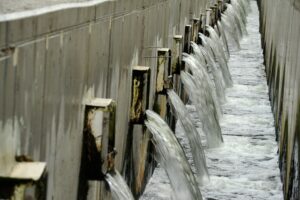by Paige Jessup, Climate Resilience Intern
Wastewater Management Planning
Without a reliable place to dispose of contaminated water, all other best management practices will not have the maximum effort they could. That is why it is important for a municipality to develop a Safe and Reliable Wastewater Treatment System. In order to have a successful wastewater treatment plant upgrade, municipalities should consider:
- Developing a long-term vision.
- Engaging with a wide range of decision makers, practitioners, regulators, and the public during all steps of the system research, development, delivery, and evaluation.
- Conducting background research that should include assessing the performance of current systems, undertaking optimization studies, conducting feasibility studies, and reviewing what other municipalities have done.
- Clearly defining the needs and desired outcomes of your project before settling on a new technological solution or deciding that optimized use of existing technology will work.
Enacting By-Laws
Enacting guidelines and by-laws for commercial operators and private pool and hot tub owners to follow is important in helping the public to understand best practices for discharging of wastewater. This will ensure the water bodies in and around your municipality are not contaminated. Municipalities can also refer and consult other municipalities on their by-laws (ex: City of Toronto, Ontario MUNICIPAL CODE CHAPTER 681, SEWERS).

Monitoring and Reporting
The Wastewater Systems Effluent Regulations, under the Fisheries Act, looks to set a minimum effluent quality standards for carbonaceous biochemical oxygen demand, suspended solids, un-ionized ammonia and total residual chlorine (Government of Canada, 2024).
Under the Fisheries Act, owners and operators are required to regularly submit monitoring reports. These reports provide information on effluent quality to ensure regional wastewater systems are meeting the standards of the Regulations. Wastewater systems report either annually or quarterly a year.
Public Engagement and Awareness
Educating the public can amplify the importance of proper waste water discharge. As such, engaging communities in proper discharge of pool and hot tub wastewater through campaigns and initiatives is a key step to a municipality’s efforts.
Watersheds Canada is launching a pool and hot tub education campaign to raise awareness on this pollution issue and help individuals and community groups become more informed to protect their freshwater areas. Together we can safeguard our aquatic ecosystems, protect wildlife, and ensure the continued health of our freshwater.
References
Government of Canada. (2024). Wastewater Systems Effluent Regulations: reporting overview. (2024). Government of Canada. Retrieved from: https://www.canada.ca/en/environment-climate-change/services/wastewater/system-effluent-regulations-reporting/overview.html#toc2
Green Municipal Fund. (n.d.) Guide: Best practices for scoping a wastewater upgrade project. Green Municipal Fund. Retrieved from: https://greenmunicipalfund.ca/resources/guide-best-practices-scoping-wastewater-upgrade-project
This blog is part of an education toolkit generously funded by:

